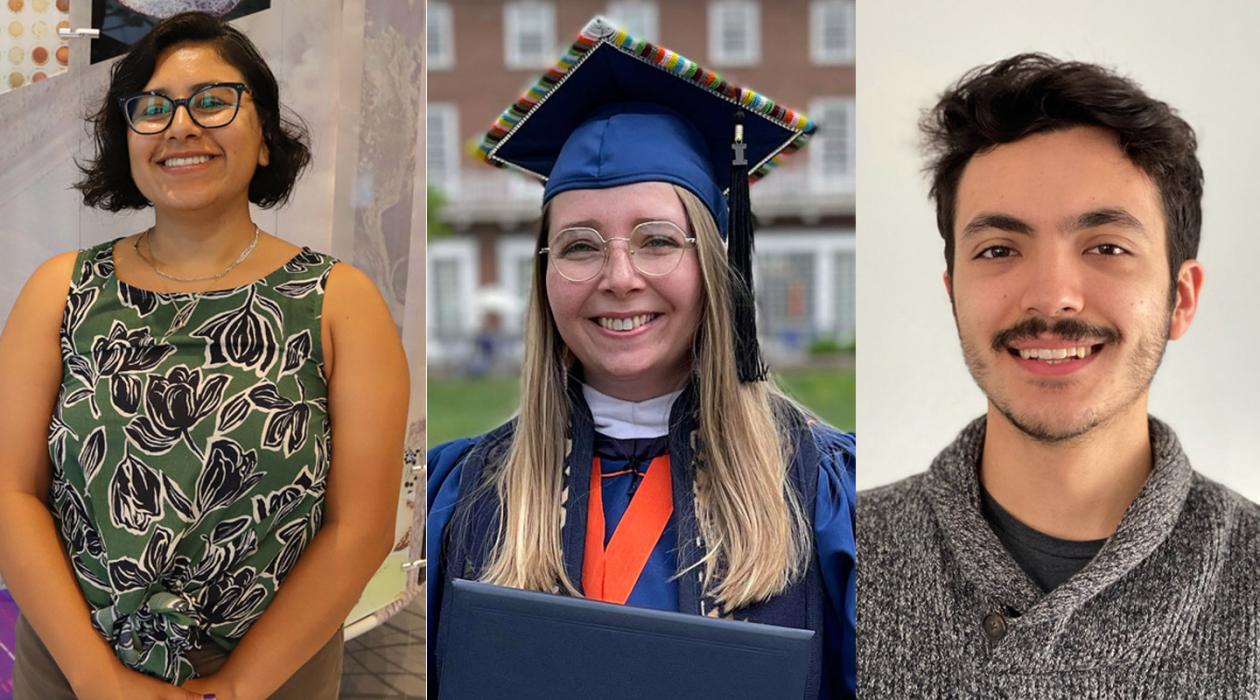Winners of the Center for Indigenous Science Scholarship announced

Center for Indigenous Science Scholarship winners, left to right: Sahara Zitlali Vilchis, Elle Sawyer, and Cordarro Mejia. Not pictured: Jalyn LaBine, Joshua Diaz
The Center for Indigenous Science is a collaboration between the American Indian studies program and the Carl R. Woese Institute for Genomic Biology. The Center aims to collaborate with the Indigenous Nations to bring forth initiatives that support tribal sovereignty and address Indigenous needs in health, history, and the environment.
The new CIS scholarship was awarded to Indigenous graduate students at the University of Illinois Urbana-Champaign who are pursuing projects in line with Indigenous Science. The scholarships range from $2,000-$8,000. “The award denotes the University's commitment to expanding the community of Indigenous scholars whose work enriches their fields of studies and community-based knowledge,” said Jacki Rand, an associate professor of American Indian studies and the Associate Vice Chancellor for Native Affairs.
The winners include Sahara Zitlali Vilchis, a graduate student in the Department of Anthropology; Elle Sawyer, a graduate student in the Department of Ecology, Evolution, and Conservation Biology; Jalyn LaBine, a graduate student in the Department of Natural Resources Environmental Sciences; Cordarro Mejia, a graduate student in the Department of Integrative Biology; and Joshua Diaz, a graduate student in the Department of Anthropology. “Supporting Indigenous students in STEM and related fields is one of our central goals at the Center. This is a great start as we work to expand opportunities and support in the future” said Ripan Malhi, a professor of anthropology and co-Director of the Center for Indigenous Science.
Sahara Zitlali Vilchis
Vilchis works in Ripan Malhi’s (CIS co-leader/GNDP/GSP/IGOH) Molecular Anthropology Lab where she investigates the diets of individuals from an ancient Native American tribe in the Northern Californian Coast. Her work requires community-based efforts and includes tribal perspectives and knowledge, which is greatly underrepresented in scientific research. As a single parent with two children, Vilchis applied to the scholarship because she wanted the extra financial support as she pursues her academic goal away from her community in California. Additionally, she also plans to use the funds to visit the community she works with. In the future, she hopes to help the future generation of learners achieve their academic goals.
Elle Sawyer
Sawyer works in Eric Larson‘s lab and works on invasive crayfish. Her projects include the rediscovery of a non-native crayfish in the northern Wisconsin lake system and a long-term-data study that examines body size changes of the invasive rusty crayfish over 4 decades. The CIS scholarship will help ease her financial burdens and allow her to focus on publishing her work. After completing her Master’s degree, she will be attending the University of Michigan Law School. “I believe that it is okay to change your mind about what you envision yourself doing,” Sawyer said. “Each portion of my journey plays a role in my worldview and goals.”
Cordarro Mejia
Mejia is enrolled in a course-based Master’s program, which has allowed him to explore new concepts. He has used his time to find what he is passionate about and pursue those interests without having the time constraint of a thesis. This scholarship holds a special place in his heart because he went through his undergraduate years applying for and being denied scholarships. Using these funds, he plans to travel through central America with his partner to see the lands that many of their family members and ancestors once inhabited. Mejia plans to apply for positions where he can pursue his interests in the fields of conservation, restoration, and sustainability.
Jalyn LaBine
LaBine works in Cory Suski’s lab and studies the spatial ecology of juvenile and adult walleye. Her work tracks the movement of walleye. By knowing their movement patterns, we can better understand which areas need to be protected so that the walleye population can continue to grow. LaBine will use her scholarship to attend the American Fisheries Society meeting in Grand Rapids this year. Since she is an online graduate student, she will also use the scholarship to travel to the Illinois campus. “It doesn’t matter what you decide to do. If you put in the work, you can achieve anything,” LaBine said.
"These scholarships reflect our belief that Indigenous students carry ancestral wisdom and have the vision we need to create liberatory and healing futures in STEM for our society. We are excited to see where their work takes them, and us," said Rochelle Gutiérrez (CIS), a professor of mathematics education in the Department of Curriculum and Instruction.
